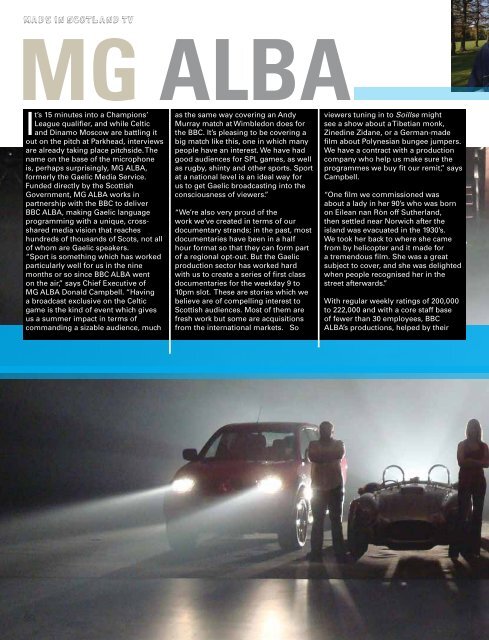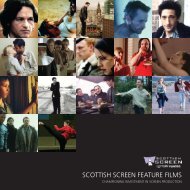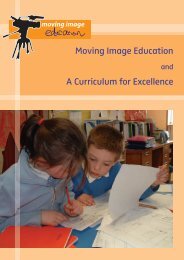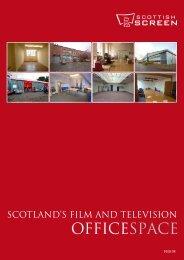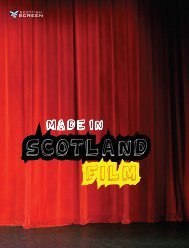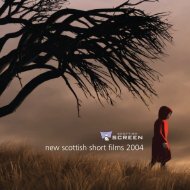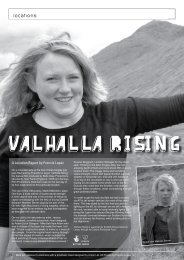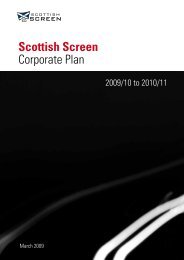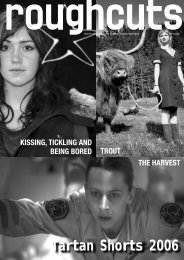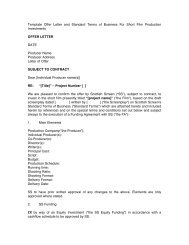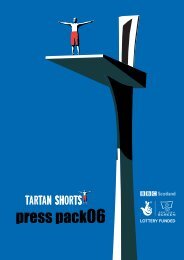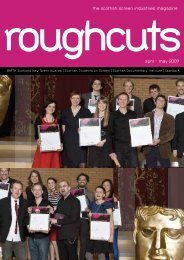SCOT- LAND - Scottish Screen
SCOT- LAND - Scottish Screen
SCOT- LAND - Scottish Screen
You also want an ePaper? Increase the reach of your titles
YUMPU automatically turns print PDFs into web optimized ePapers that Google loves.
made in scotlanD TV<br />
MG ALBA<br />
It’s 15 minutes into a Champions’<br />
League qualifier, and while Celtic<br />
and Dinamo Moscow are battling it<br />
out on the pitch at Parkhead, interviews<br />
are already taking place pitchside. The<br />
name on the base of the microphone<br />
is, perhaps surprisingly, MG ALBA,<br />
formerly the Gaelic Media Service.<br />
Funded directly by the <strong>Scottish</strong><br />
Government, MG ALBA works in<br />
partnership with the BBC to deliver<br />
BBC ALBA, making Gaelic language<br />
programming with a unique, crossshared<br />
media vision that reaches<br />
hundreds of thousands of Scots, not all<br />
of whom are Gaelic speakers.<br />
“Sport is something which has worked<br />
particularly well for us in the nine<br />
months or so since BBC ALBA went<br />
on the air,” says Chief Executive of<br />
MG ALBA Donald Campbell. “Having<br />
a broadcast exclusive on the Celtic<br />
game is the kind of event which gives<br />
us a summer impact in terms of<br />
commanding a sizable audience, much<br />
as the same way covering an Andy<br />
Murray match at Wimbledon does for<br />
the BBC. It’s pleasing to be covering a<br />
big match like this, one in which many<br />
people have an interest. We have had<br />
good audiences for SPL games, as well<br />
as rugby, shinty and other sports. Sport<br />
at a national level is an ideal way for<br />
us to get Gaelic broadcasting into the<br />
consciousness of viewers.”<br />
“We’re also very proud of the<br />
work we’ve created in terms of our<br />
documentary strands; in the past, most<br />
documentaries have been in a half<br />
hour format so that they can form part<br />
of a regional opt-out. But the Gaelic<br />
production sector has worked hard<br />
with us to create a series of first class<br />
documentaries for the weekday 9 to<br />
10pm slot. These are stories which we<br />
believe are of compelling interest to<br />
<strong>Scottish</strong> audiences. Most of them are<br />
fresh work but some are acquisitions<br />
from the international markets. So<br />
viewers tuning in to Soillse might<br />
see a show about a Tibetian monk,<br />
Zinedine Zidane, or a German-made<br />
film about Polynesian bungee jumpers.<br />
We have a contract with a production<br />
company who help us make sure the<br />
programmes we buy fit our remit,” says<br />
Campbell.<br />
“One film we commissioned was<br />
about a lady in her 90’s who was born<br />
on Eilean nan Ròn off Sutherland,<br />
then settled near Norwich after the<br />
island was evacuated in the 1930’s.<br />
We took her back to where she came<br />
from by helicopter and it made for<br />
a tremendous film. She was a great<br />
subject to cover, and she was delighted<br />
when people recognised her in the<br />
street afterwards.”<br />
With regular weekly ratings of 200,000<br />
to 222,000 and with a core staff base<br />
of fewer than 30 employees, BBC<br />
ALBA’s productions, helped by their<br />
22


